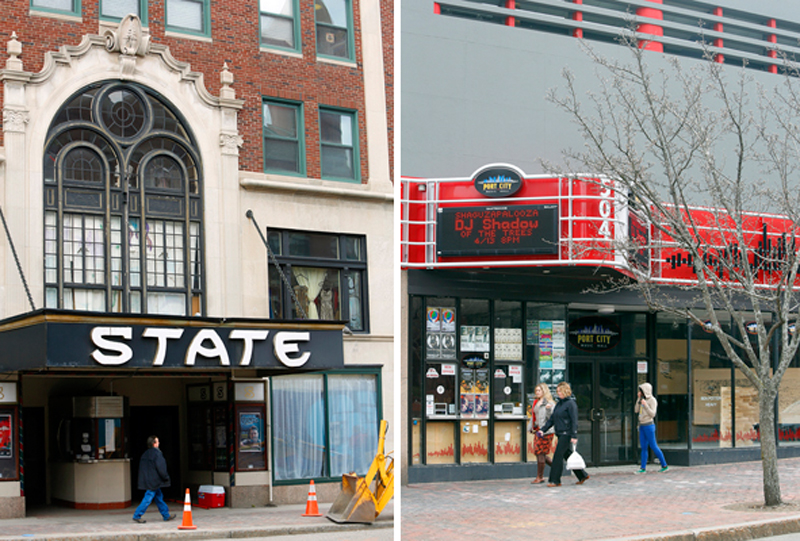PORTLAND – The owner of the State Theatre is buying the nearby Port City Music Hall and says it plans to increase the amount of local music at the venue.
Crobo LLC is still finalizing the deal to buy the venue on Congress Street and put two key performance halls in downtown Portland under the same ownership, said Lauren Wayne, general manager of the State Theatre.
A selling price has been agreed on, Wayne said, but she wouldn’t disclose it.
With capacity for 530 people, “it’s a great size room for Portland,” Wayne said. “We wanted to make sure it stays open.”
Rob Evon said Thursday that he and his wife have been trying to sell Port City Music Hall for more than year. In January, he was diagnosed with an illness that landed him in the hospital for a month, he said, and managing a business became too much.
“The night life is great, but it is also stressful,” said Evon, who is in better health now. “Being the sole owner of an independently promoted nightclub became taxing physically and all that.”
Crobo LLC will appear before the City Council on Monday to seek the necessary food, liquor and entertainment licenses to operate its former competitor.
The State Theatre, with a capacity of 1,450, draws well-known performers and is an anchor of the busy music scene in Portland’s arts district. Port City Music Hall, a few blocks away on Congress Street, features up-and-coming acts in a more intimate space.
Crobo LLC will retain the Port City Music Hall name. Upgrades are planned for the basement area, and the venue will offer food during shows, Wayne said.
Evon said he expects the change of ownership will be official in early May. Wayne said Port City Music Hall may close for a week or two for renovations.
“It’s really important for this (transition) to be as seamless as possible,” she said.
The State Theatre’s managers have put on shows at Port City Music Hall. Wayne said the State Theatre has rented the facility and put on about 20 shows in the past six months, and has more coming up.
“We really enjoy doing shows there,” she said.
Wayne said Port City Music Hall will be rented for private functions, but the focus will be on musical performances.
“We’re interested in doing more local music,” she said.
Port City used to feature local bands one night a week. Every Tuesday, patrons could pay $2 to see two local bands and buy $2 drinks, Evon said.
Bands were paid only what was collected at the door, but often left with promotional photos and high-quality live recordings, he said.
After more than two years of the weekly shows, the local-bands night fizzled, he said.
Evon said it got increasingly difficult to compete with large promoters, such as Live Nation, that work with competing venues in the region. The number of music venues in Portland makes it difficult to turn a profit, he said.
“What I saw happening was too many musical offerings in a city the size of Portland,” Evon said. “At a certain point, your pool of ticket buyers runs out.”
Crobo LLC is a partnership between Alex Crothers and James Glancy, who teamed up in 2010 to reopen the State Theatre after a $1.5 million renovation of the seats, stage and sound system.
Glancy, the former New York division director of Live Nation, is a partner in The Bowery Presents, which puts on shows in several New York City clubs. Crothers is co-owner of High Ground in Burlington, Vt., which has capacity for 900 people and puts on more than 400 shows a year.
The new ownership will be good for Portland’s music scene, said Nick Rosenblum, events programmer for Space Gallery, a smaller venue on Congress Street that features music by local and regional bands and puts on art shows and other events.
Space Gallery and the State Theatre occasionally co-sponsor shows. Rosenblum said he is not worried about added competition, especially because Space Gallery books different types of bands.
“(Wayne) is aware of a lot of touring bands and she can help feed the right shows to the right venues,” he said. “In a town like Portland’s size, I think it’s great when venues and promoters can work together.”
Port City Music Hall, which opened in 2009, is one of the few venues in Portland with after-hours dancing. It can stay open until 3 a.m., although alcohol cannot be served after 1 a.m. so it offers an alcohol-free place to socialize after other bars close.
City code limits after-hours events at each venue to two a month, but Port City Music Hall is not subject to the limit because it applied for its license before the council enacted the limit last year, said City Clerk Katherine Jones.
Jones said there have been no issues with the after-hours operation at Port City Music Hall, but the city’s staff is reviewing whether its exemption from the monthly limit will be transferred to the new owner.
Evon said he put on only about a dozen after-hour shows, only one of which made money. Wayne said after-hours events will not be a big a part of the future business plan.
Randy Billings can be contacted at 791-6346 or at:
rbillings@pressherald.com
Twitter: @randybillings
Send questions/comments to the editors.




Success. Please wait for the page to reload. If the page does not reload within 5 seconds, please refresh the page.
Enter your email and password to access comments.
Hi, to comment on stories you must . This profile is in addition to your subscription and website login.
Already have a commenting profile? .
Invalid username/password.
Please check your email to confirm and complete your registration.
Only subscribers are eligible to post comments. Please subscribe or login first for digital access. Here’s why.
Use the form below to reset your password. When you've submitted your account email, we will send an email with a reset code.